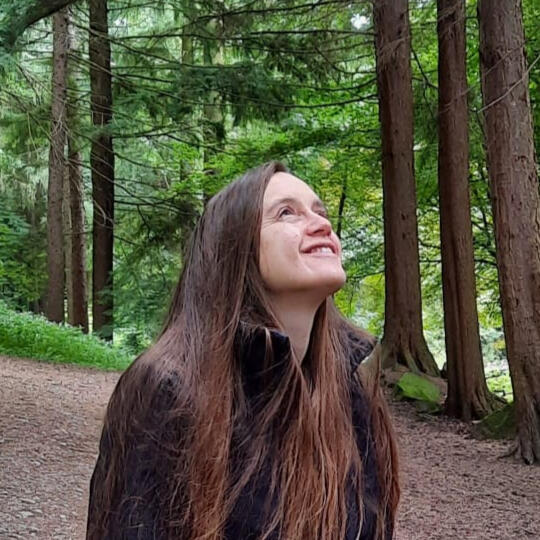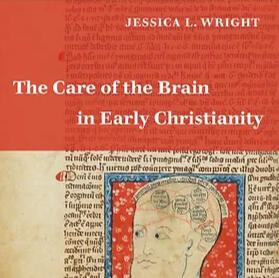
Jess Wright
she/they
experimental writer - historian of the body - plant witch
Bio
I am a queer writer, historian, and teacher living in West Yorkshire. My work has appeared in literary and academic journals, in anthologies and edited volumes, and in zines. My first book, a monograph titled The Care of the Brain in Early Christianity, was published by the University of California Press in 2022. I hold degrees from Cambridge and Princeton, and I'm an alum of the Tin House Summer Workshop. I have taught in community settings, prisons, secondary schools, and universities. At present, I teach in the Lifelong Learning Centre at the University of Leeds.
Writing: Selected Publications
2024
My girlfriend crawls inside the fruitcage - Paragraph Planet (Feb 2, 2024) (micro fiction)
second anniversary - republication in Sea Change, Red Moon Press (concrete poem)2023
Unpacking the hermit crab essay - Write or Die (craft essay)
Hibiscus - Queerlings 7 (flash memoir)
so to speak - streetcake magazine 86 (cut-up poem)
second anniversary - Whiptail Journal 7 (concrete poem)
Review of Female Homosexuality in Ancient Greece and Rome by Sandra Boehringer - Bryn Mawr Classical Review (academic book review)
Lips - t'ART Magazine 5 (free verse)2022
The Care of the Brain in Early Christianity - University of California Press (academic monograph)
Rethinking catharsis: gender, mental disorder, and emotions - The Rootcutter (essay on history of medicine)
A visit to my ex-wife and her new girlfriend - Microfiction Monday - 200th edition (micro fiction)
A pair of shoes - Shirley Magazine 22 (experimental fiction)
They call it clay, we call it meat - Thanatos Review 1 (flash essay)
Yellowhammer - Whiptail Journal 2 (sequence of one-line poems)
Retranslations - Tiny Spoon 9: Cut / Copy / Paste : The Remix (erasure poems)
On sponges - Foglifter Journal 7 (lyric essay)
Y is for Yellowhammer - Mslexia 93 (flash memoir)
On what is in our power - Michigan Quarterly Review 61.1 (braided essay)2021 and earlier
A still unknown city - clavmag 7 (memoir)
Commentary on personal ads - Sapphic Writers Collective: Closeness (hermit crab essay)
Crazy talk: the dangerous rhetoric of mental illness - Eidolon (essay)
Latin behind bars: teaching college Latin in an American prison - Eidolon (essay)
Pindar's Eleventh Pythian Ode - Tellus 6 (version of an ancient Greek poem)
Flight - L + S Press (poem - broadside)
Hare, breathing - Third Annual James Kirkup Memorial Poetry Anthology (free verse, runner up)
Private correspondence - The Prose-Poem Project 2.4 (prose poem)
Schwanenlied - Prole (free verse)
After the fact - Lines + Stars (free verse)
Research
Review of The Care of the Brain in Early Christianity (UC Press, 2022):
“[I]t is a well-researched and beautifully written study of the concept of the brain as a powerful and multi-functional tool, focusing on Christian authors’ explorations of self-governance, salvation, and human identity.”Kyriakoula Tzorzopoulou, in Bryn Mawr Classical Review
“Surpassingly well-researched and beautifully written, TheCare of the Brain uncovers surprising new facets of ancient Christian thought. Jessica Wright argues persuasively that the brain—unmentioned in the New Testament—was nevertheless a necessary concept for the development of early Christian culture, especially ascetic practice.”Ellen Muehlberger, author of Moment of Reckoning: Imagined Death in Late Ancient Christianity
I hold a PhD in Classics and a graduate certificate in History of Science from Princeton University, where I was supervised by Brooke Holmes. My doctoral dissertation, Brain and Soul in Late Antiquity, became the basis for my first book, The Care of the Brain in Early Christianity (University of California Press, 2022). I am currently finishing a second book (under contract with Bloomsbury Academic), which examines the ways in which modern psychiatry has drawn upon and imagines itself as connected to ancient Greek medicine and philosophy.I have published academic journal articles, book chapters in edited volumes, book reviews, and blog posts. I've delivered invited lectures, workshops, and conference papers at, among other conferences, the Society for Classical Studies, the North American Patristics Society, the History of Science Society, and the British Society for the History of Science.I was a co-founding editor of The Rootcutter (a blog attached to the Society for Ancient Medicine) and a founding member of Classics and Social Justice and ReMeDHe (a working group for religion, medicine, disability, and health in late antiquity).My academic writing has won the following prizes: Peter R. Brown Prize; John J. Winkler Memorial Prize; North American Patristics Society Graduate Student Paper Prize.My research has been supported by grants from Princeton University (Center for Culture, Religion, and Society), University of Southern California, and the North American Patristics Society. My second book has received financial support from the Society of Authors.In 2021, I left a position as Assistant Professor at the University of Texas at San Antonio in order to return to the UK, where I have begun the shift from working primarily as a researcher to creative and experimental writing that includes, but is not limited to, history of medicine and the body. I am currently a member of Writing the Now, a collective of experimental academic writers at the University of Leeds.
Workshops
I run community-based workshops in writing (including erasure poetry and cut-ups) and zine-making.I have facilitated workshops for Gemini Ink, Arts & Minds, Leeds Poetry Festival, Leeds2023, and the Leeds LGBTQ+ Community Consortium. Currently, I run a monthly Generative Writing Lab at The Bookish Type (a queer bookshop in Leeds) and a weekly co-writing session for the Lifelong Learning Centre at the University of Leeds.At the heart of my facilitation practice is the belief that connection (both to others and to our own embodied selves) is the foundation of meaningful creativity. In practice, this looks like space to play and experiment with new materials, forms, and ideas, as well as opportunities for reflection and messiness in community with one another.If you're interested in organising a workshop, please get in touch with a brief description of what you are interested in and the intended audience.
Contact
